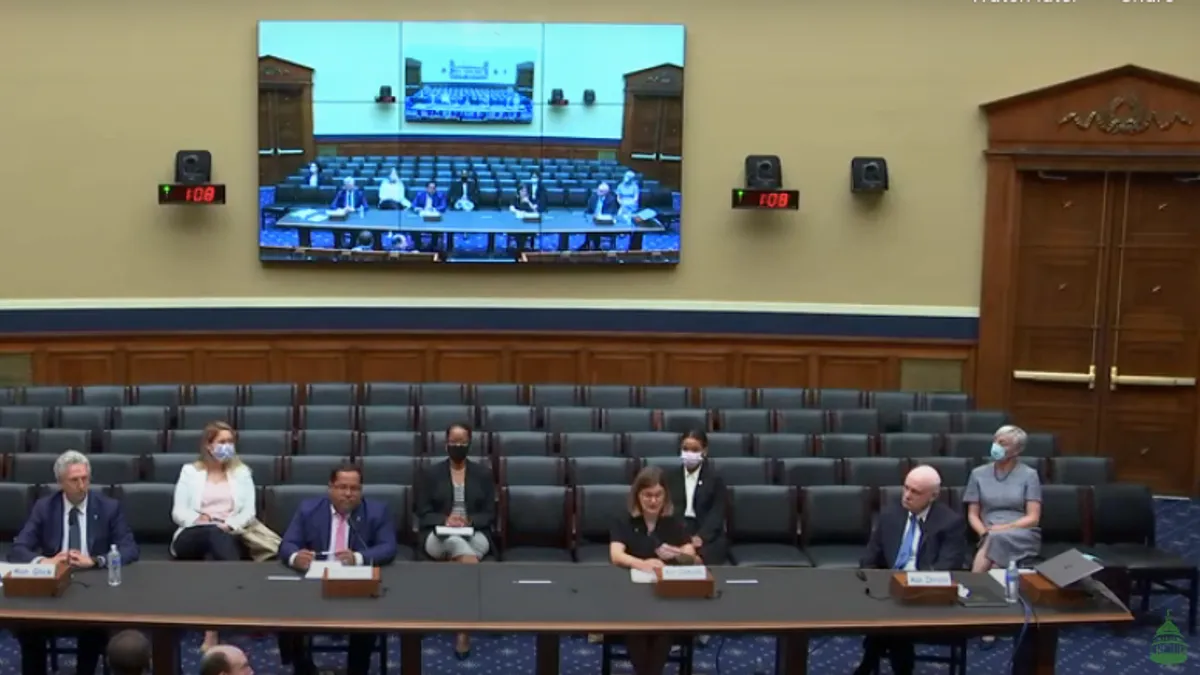Dive Brief:
-
Cybersecurity, transmission reform and the future of pipeline deliberations came under scrutiny Tuesday during a House hearing focused on federal energy regulatory authorities.
-
Members of the House Energy and Commerce Committee's Subcommittee on Energy were largely focused on the Federal Energy Regulatory Commission's ongoing proceedings regarding its pipeline certification policy statement and transmission reform, as well as the fallout from the SolarWinds and Colonial pipeline cyberattacks. "There's no doubt that ... the biggest threat facing the electric grid today is cybersecurity," FERC Chair Richard Glick said.
-
Commissioner Neil Chatterjee called for better coordination of the private and public sectors in fending off cyberattacks, while other commissioners cautioned that FERC is not suited to solely tackle the complex issue of cybersecurity regulation.
Dive Insight:
There are outstanding questions about FERC's regulatory role as the grid becomes more vulnerable to cyber threats.
Recent attacks on U.S. energy infrastructure, including on the Colonial Pipeline and through the SolarWinds malware attack, have raised new questions about cybersecurity regulations on the energy sector. Glick and Commissioner Allison Clements in May after the Colonial attack called for mandatory cybersecurity standards for the oil and gas industry, similar to mandates on the electric power system. Glick echoed that call Tuesday, and also called for specific security standards on the utility supply chain in light of the SolarWinds hack, which targeted customers of the software company, including some energy companies.
"The supply chain is not safe enough, currently, in terms of protect[ion] from cybersecurity threats," he said, adding that although FERC requires utilities to have a plan in place to address supply chain risks, the commission should implement more specific standards.
Chatterjee and Commissioner Mark Christie said they did not oppose mandatory standards, but noted other regulatory vulnerabilities have become clear in recent months that could be lower hanging fruit. For example, classified briefings need to be made more available to the private actors those briefings concern in some instances, said Chatterjee.
"I had a CEO of a natural gas pipeline company tell me he was briefed by [the Office of the Director of National Intelligence] at a high level that his system was vulnerable, but no one in his company even had a high enough security clearance to gain access to the classified briefing necessary to know where to make an investment in their system," he said. "These kinds of things are easily remedied."
Christie and Commissioner James Danly cautioned that FERC is an economic regulator, and that its regulatory authority is limited when it comes to ensuring cybersecurity of energy infrastructure broadly.
"Our authority is limited, and our expertise — which was outstanding in the cybersecurity area — is still limited," said Christie. "So I think that when you look at what happened in Colonial Pipeline, the seriousness of that really demands a response much higher than an economic regulator, such as FERC."
Republicans and Democrats on the subcommittee were split on how or whether they felt the commission should consider environmental justice and climate change when reviewing whether to approve a gas pipeline or other infrastructure. Republicans expressed concern about FERC considering greenhouse gas emissions, arguing that the commission is not an environmental regulator, but Glick maintained that the commission was directed by several court decisions to be more judicious in how it approves pipelines, including considering their impacts on the climate crisis. He also said that considering these impacts does not necessarily mean the commission won't approve the project, as was the case in FERC's approval of the Northern Natural pipeline replacement.
"Just because you were to find a particular project that has a significant level of emissions doesn't mean you have to deny the project," Glick said.
Some Republican lawmakers also expressed concern about the potential cost of transmission reform.
"Simply put, ratepayers should not be forced to subsidize transmission lines or sacrifice 24/7 grid reliability in order to connect renewable projects to big cities. And when considering new transmission FERC should not be picking winners, among renewable developers, while sacrificing reliability and cost," said Ranking Member of the Subcommittee Fred Upton, R-Mich.
But Glick and Clements emphasized the commission's aim to reduce power grid costs while improving reliability through better transmission planning.
"Initial analyses of the February cold weather event and previous polar vortex conditions have consistently demonstrated the reliability and resilience potential of high voltage transmission investment," said Clements. "In addition, all credible studies considering cost effective decarbonization pathways include significant high voltage transmission as a central component."















